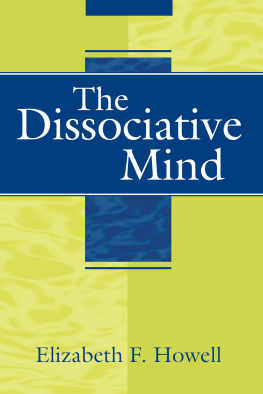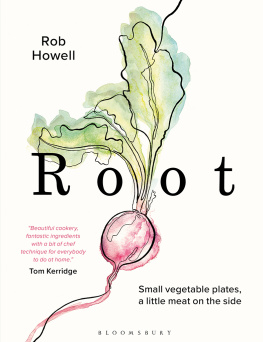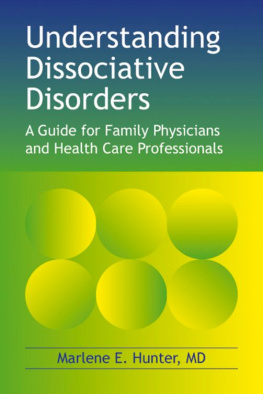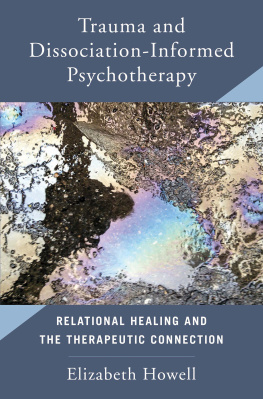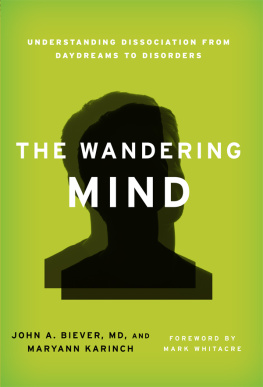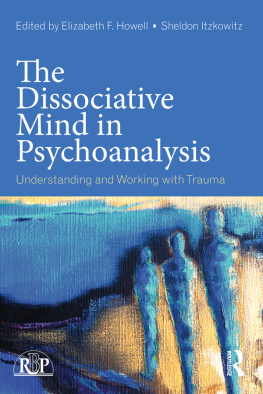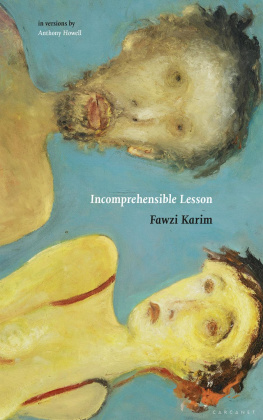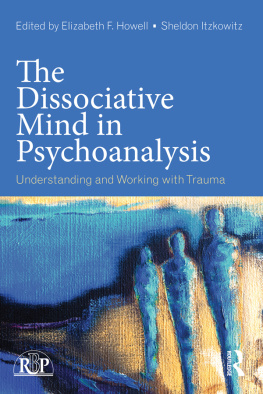Howell - The Dissociative Mind
Here you can read online Howell - The Dissociative Mind full text of the book (entire story) in english for free. Download pdf and epub, get meaning, cover and reviews about this ebook. City: New York, year: 2005, publisher: Taylor & Francis (CAM);Routledge, genre: Religion. Description of the work, (preface) as well as reviews are available. Best literature library LitArk.com created for fans of good reading and offers a wide selection of genres:
Romance novel
Science fiction
Adventure
Detective
Science
History
Home and family
Prose
Art
Politics
Computer
Non-fiction
Religion
Business
Children
Humor
Choose a favorite category and find really read worthwhile books. Enjoy immersion in the world of imagination, feel the emotions of the characters or learn something new for yourself, make an fascinating discovery.
- Book:The Dissociative Mind
- Author:
- Publisher:Taylor & Francis (CAM);Routledge
- Genre:
- Year:2005
- City:New York
- Rating:4 / 5
- Favourites:Add to favourites
- Your mark:
- 80
- 1
- 2
- 3
- 4
- 5
The Dissociative Mind: summary, description and annotation
We offer to read an annotation, description, summary or preface (depends on what the author of the book "The Dissociative Mind" wrote himself). If you haven't found the necessary information about the book — write in the comments, we will try to find it.
Howell: author's other books
Who wrote The Dissociative Mind? Find out the surname, the name of the author of the book and a list of all author's works by series.
The Dissociative Mind — read online for free the complete book (whole text) full work
Below is the text of the book, divided by pages. System saving the place of the last page read, allows you to conveniently read the book "The Dissociative Mind" online for free, without having to search again every time where you left off. Put a bookmark, and you can go to the page where you finished reading at any time.
Font size:
Interval:
Bookmark:

THE DISSOCIATIVE MIND
THE DISSOCIATIVE MIND
Elizabeth F. Howell

Routledge | Routledge |
Taylor & Francis Group | Taylor & Francis Group |
711 Third Avenue | 27 Church Road, Hove |
New York, NY 10017 | East Sussex BN3 2FA |
2005 by Taylor & Francis Group, LLC
Routledge is an imprint of Taylor & Francis Group, an Informa business
International Standard Book Number-13: 978-0-88163-495-2 (Softcover)
Library of Congress Card Number 2005048341
Earlier versions of appeared in Vol., 4 No. 3 and Vol. 3, No. 4 of The Journal of Trauma
and Dissociation Haworth Press.
Except as permitted under U.S. Copyright Law, no part of this book may be reprinted, reproduced, transmitted, or utilized in any form by any electronic, mechanical, or other means, now known or hereafter invented, including photocopying, microfilming, and recording, or in any information storage or retrieval system, without written permission from the publishers.
Trademark Notice: Product or corporate names may be trademarks or registered trademarks, and are used only
for identification and explanation without intent to infringe.
Library of Congress Cataloging-in-Publication Data
Howell, Elizabeth F., 1946
The dissociative mind / Elizabeth F. Howell
p. cm.
Includes bibliographical references and index.
ISBN 0-88163-495-6
1. Dissociation (Psychology). 2. Dissociative disorders. I. Title.
RC553.D5H69 2005
616.8523dc22
2005048341
Visit the Taylor & Francis Web site at
http://www.taylorandfrancis.com
and the Routledge Web site at
http://www.routledgementalhealth.com
CONTENTS
PREFACE
D issociation pervades psychic life, and the capacity for it is built into our DNA. A variation on Harry Stack Sullivans (1953) famous dictum that everyone is more simply human than otherwise might be that dissociation is far more common in humans than otherwise. Our ordinary language reveals an implicit conversance with a divided self. Such expressions as falling apart, coming unglued, and being beside oneself imply parts that are not cohesive. The common exhortation Pull yourself together implies parts that are segregated from each other. Various forms of dualism, Cartesian dualism (separation of mind from body), Dr. Jekyll and Mr. Hyde, and even many gendered attributes imply a dissociation of one realm of experience from another.
Although dissociation theory has existed side by side with the doctrine of repression in the history of psychoanalytic thinking, the fact of dissociation was, for many years, less focally examined, even largely dissociated. Although psychoanalysis traces its origins to the treatment of dissociation and trauma (Breuer and Freud, 18931895), from the early 1900s until 15 or 20 years ago, the current dissociation field grew in a barren climate. Multiplicity and the dissociative structuring of the mind did not receive the attention they are beginning to draw today, and dissociative identity disorder, previously called multiple personality disorder, was thought to be extremely rare. In contrast, today the fields of psychoanalysis and traumatology are coming together. This is fitting because they complement each other.
Today, the mental health field is paying more and more attention to dissociation and dissociative experiences. In psychoanalysis, this is partially attributable to the growing appreciation of the relational model, in which multiplicity and dissociative processes are implicit. When we take into account the internalization of multiple aspects of attachment relationships, plus the likelihood of some relational trauma, it is clear that a construct of psychic structuring based on relationships must include dissociation. More broadly, the increased interest in dissociation stems from the recent public explosion of information concerning the widespread prevalence of psychological trauma. Following the Vietnam War, which prompted the formulation of the diagnostic term posttraumatic stress disorder (PTSD), not only the atrocities of war but other, more commonplace atrocities such as child sexual abuse suddenly became more thinkable. Traumatologists such as Brown (1991) and Herman (1992) noticed that trauma is not outside the realm of ordinary experience as it had been previously defined but exists within the realm of the ordinary especially for survivors of sexual and physical child abuse.
Trauma and Dissociation
Trauma is a confusing word. A common meaning of psychological trauma is of an objectively massive, threatening event, one that would be overwhelming to anyone. For instance, a condition for the diagnosis of PTSD in the Diagnostic and Statistical Manual of Mental Disorders, Fourth Edition (DSM-IV; 1994) is that the person experienced, witnessed, or was confronted with an event or events that involved actual or threatened death or serious injury, or a threat to the physical integrity of self or others (pp. 427428). The objective meaning is often qualified, however, with the observation that not everyone who has been subjected to trauma develops posttraumatic stress. It appears that various kinds and severity of traumatic events affect people differently. More specifically, many believe that trauma refers to what is overwhelming to the individual.
A problem in this twofold way of thinking of trauma is that we often face the dilemma of using the same word to denote either meaning, with the result that the meaning stays fuzzy. When we focus on objective trauma, we often gloss more lightly over its effects on the individual mind. Yet from the traumatized persons perspective, trauma disrupts reflective functioning; indeed, it nearly wipes out the ability to think. As Herman (1992) said, at the moment of trauma the victim is rendered helpless by overwhelming force (p. 33). Thus, in this meaning, which refers to the individual, trauma is not just something upsetting or distressing, even if it is extremely so. Trauma refers to event(s) that could not be assimilated. If the traumatic event could not be taken in, it cannot be linked with other experience, and there is now a structural dissociation of experience, whether small or large (Van der Hart et al., 2004). In short, the result of trauma is dissociation.
For the reasons just described, I propose a simplified definition of trauma as the event(s) that cause dissociation. Thinking of trauma this way, in terms of its effect, puts the focus on the splits and fissures in the psyche rather than solely on the external event. It might be argued that two apparent problems with this proposal are that (1) dissociation does not necessarily require trauma and that (2) dissociation is not always clearly discernable to others or to the self. However, (1) the larger definition of dissociation is not changed by this meaning of trauma. Moreover, (2) dissociated experience that does not intrude or appear to be otherwise evident can be occurring. A person can be functioning well and seemingly be resilient to trauma, only to break down when, for instance, her daughter reaches the age at which she was herself abused.
Trauma, Dissociation, and Psychopathology
The rising tide of trauma and dissociation studies has created a sea change in the way we think about psychopathology. Chronic trauma (according to the meaning I propose) that occurs early in life has profound effects on personality development and can lead to the development of dissociative identity disorder (DID), other dissociative disorders, personality disorders, psychotic thinking, and a host of symptoms such as anxiety, depression, eating disorders, and substance abuse. In my view, DID is simply an extreme version of the dissociative structure of the psyche that characterizes us all. Dissociation, in a general sense, refers to a rigid separation of parts of experience, including somatic experience, consciousness, affects, perception, identity, and memory. When there is a structural dissociation, each of the dissociated self-states has at least a rudimentary sense of I (Van der Hart et al., 2004). In my view, all of the environmentally based psychopathology or problems in living can be seen through this lens.
Font size:
Interval:
Bookmark:
Similar books «The Dissociative Mind»
Look at similar books to The Dissociative Mind. We have selected literature similar in name and meaning in the hope of providing readers with more options to find new, interesting, not yet read works.
Discussion, reviews of the book The Dissociative Mind and just readers' own opinions. Leave your comments, write what you think about the work, its meaning or the main characters. Specify what exactly you liked and what you didn't like, and why you think so.

